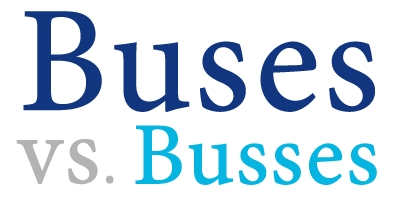Have you ever wondered about the differences between public transportation and public displays of affection?
Chances are good that you haven’t because those two things are not related to each other. The words buses and busses are almost identical, though, and they each describe one of those actions.
Thus, if you want to describe your morning commute accurately to a coworker or classmate, you will need to know the difference between these words.
What is the Difference Between Buses and Busses?
In this post, I will compare buses vs. busses. I will use each of these words in an example sentence, so you can see them in context.
Plus, I will show you a memory trick that will help you decide whether to use buses or busses in your own writing.
When to Use Buses
 What does buses mean? Buses can be a noun or a verb.
What does buses mean? Buses can be a noun or a verb.
As a noun, buses is the plural of the word bus, which is a vehicle for transporting groups of people. In information technology, it can also mean a connection hub, like in the phrase universal serial bus.
For example,
- There is a traffic slowdown on 112th because two buses collided at an intersection.
- There is always heavy traffic on Interstate 5, even though no buses run on it.
- While the senators were getting off their buses, Trump went before the cameras to announce that he’s directed the secretary of education to investigate whether there are too many federal regulations of public schools. –The New York Times
As a verb, buses is the third person singular present tense form of bus, which means to travel by bus or to transport people by bus. In food service, it can also mean to clear a table of dishes.
For example,
- Every day, the district buses children to school even if they live half an hour away.
- Alisha is concerned with the environmental impact of her commute, so she buses to work four days a week.
- Hundreds of rebel fighters and civilians, including small children swaddled in thick blankets, were bused out of war-ravaged Aleppo in heavy snow on Wednesday as the evacuation of former rebel strongholds entered its final phase. –The Wall Street Journal
When to Use Busses
 What does busses mean? Busses is the third person singular present tense conjugation of the verb buss, which means to kiss. It can also be the plural of the noun buss, where it means more than one kiss.
What does busses mean? Busses is the third person singular present tense conjugation of the verb buss, which means to kiss. It can also be the plural of the noun buss, where it means more than one kiss.
For example,
- “If Alonso busses Margaret in front of me one more time, I’m going to throw a fit!” said Emily.
- “My dad busses my mom every day when she gets home from work,” said Fred.
Today, busses is no longer common in these contexts. If a writer needed to describe kisses or kissing, he or she would simply use kiss.
That said, busses should not be used in the context of transportation. Most of your audience won’t know the difference, but you will give careful readers the wrong impression.
As The AP Stylebook entries on these two words state,
bus, buses Transportation vehicles. The verb forms: bus, bused, busing.
buss, busses Kisses. The verb forms: buss, bussed, bussing.
Trick to Remember the Difference
 Now, let’s go over a trick to remember busses vs. buses.
Now, let’s go over a trick to remember busses vs. buses.
You should always use buses in the context of transportation. Busses is a misspelling in these situations. And in most cases, kiss is a better choice than buss.
Remember, buses does not double the S like kisses. Since both buss and kiss contain a double S, you will always know that these words are synonyms.
Summary
Is it buses or busses? Both of these spellings refer to nouns and verbs—but different nouns and verbs.
- Buses is used in the context of transportation.
- Busses is a different words that means kisses.
What is the plural of bus?
- If you are referring to transportation vehicles, the plural is buses.
If you are referring to kisses, the plural is busses.
Contents
